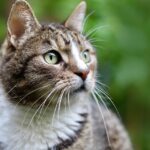Unlocking a Radiant Coat: The Best Vitamins for Cats with Dull Fur
A shiny, healthy coat is a beautiful indicator of a cat’s overall well-being. When your feline friend’s fur loses its luster and appears dull, it can be a sign that something isn’t quite right. While a dull coat can sometimes be a symptom of underlying health issues, it can often be improved with the right nutrition, specifically incorporating essential vitamins. This article explores the world of vitamins for cats and how they can help you restore your cat’s coat to its former glory.
Understanding the Importance of a Healthy Coat
A cat’s coat isn’t just for show; it serves several vital functions:
- Protection: Fur acts as a natural insulator, keeping your cat warm in the winter and cool in the summer.
- Barrier: The coat protects the skin from the sun’s harmful UV rays, abrasions, and minor injuries.
- Sensory Input: Whiskers and other specialized hairs are crucial for navigation and sensing the environment.
- Social Communication: A well-groomed coat contributes to a cat’s confidence and overall appearance, playing a role in social interactions with other cats.
What Causes a Dull Coat in Cats?
Several factors can contribute to a dull or lackluster coat in cats. These include:
- Poor Diet: A diet lacking essential nutrients, especially fats and proteins, can directly impact coat health.
- Dehydration: Insufficient water intake can lead to dry skin and a dull coat.
- Underlying Health Conditions: Kidney disease, thyroid problems, allergies, and parasitic infestations can all affect coat quality.
- Age: As cats age, their ability to absorb nutrients may decrease, leading to a duller coat.
- Grooming Habits: Inadequate grooming, especially in long-haired breeds, can lead to matting and a dull appearance.
- Stress: Stress can impact a cat’s overall health, including their coat.
The Role of Vitamins in Coat Health
Vitamins play a crucial role in maintaining a healthy coat in cats. They support various bodily functions, including cell growth, skin health, and immune system function. Here are some of the most beneficial vitamins for promoting a shiny and vibrant coat:
Vitamin A: Vitamin A is essential for healthy skin and coat. It supports the growth and repair of skin cells and helps maintain the integrity of the skin’s protective barrier. A deficiency can lead to dry, flaky skin and a dull coat.
- How it Helps: Promotes healthy skin cell turnover, prevents dryness, and contributes to a shiny coat.
- Sources: Liver, egg yolks, fortified cat food.
Vitamin E: Vitamin E is a powerful antioxidant that protects skin cells from damage caused by free radicals. It also helps to moisturize the skin and promote healthy hair growth.
- How it Helps: Protects skin from damage, moisturizes, and supports healthy hair growth.
- Sources: Vegetable oils, nuts, seeds, fortified cat food.
B Vitamins: The B vitamins, including biotin, niacin, and pantothenic acid, are crucial for energy metabolism and cell growth. They play a vital role in maintaining healthy skin and coat.
- Biotin (Vitamin B7): Specifically important for keratin production, the protein that makes up hair and nails. A biotin deficiency can lead to hair loss and a dull coat.
- How it Helps: Supports keratin production, promotes hair growth, and prevents hair loss.
- Sources: Liver, eggs, yeast, fortified cat food.
- Niacin (Vitamin B3): Helps maintain healthy skin and prevents dryness.
- How it Helps: Promotes healthy skin and prevents dryness.
- Sources: Meat, poultry, fish, fortified cat food.
- Pantothenic Acid (Vitamin B5): Supports the production of healthy skin cells.
- How it Helps: Supports the production of healthy skin cells.
- Sources: Meat, poultry, fish, fortified cat food.
- Biotin (Vitamin B7): Specifically important for keratin production, the protein that makes up hair and nails. A biotin deficiency can lead to hair loss and a dull coat.
Omega-3 Fatty Acids: While technically not vitamins, omega-3 fatty acids are essential for coat health. They reduce inflammation, moisturize the skin, and promote a shiny coat.
- How it Helps: Reduces inflammation, moisturizes the skin, promotes a shiny coat.
- Sources: Fish oil (salmon, tuna, mackerel), flaxseed oil, algae oil.
Choosing the Right Vitamins for Your Cat
When choosing vitamins for your cat, it’s important to consider the following:
- Quality: Opt for high-quality supplements from reputable brands. Look for products that have been tested for purity and potency.
- Ingredients: Carefully review the ingredient list to ensure the supplement contains the necessary vitamins and is free from harmful additives.
- Form: Vitamins are available in various forms, including powders, liquids, and chewable tablets. Choose a form that your cat will readily accept.
- Dosage: Follow the manufacturer’s instructions carefully and never exceed the recommended dosage.
- Consultation: Always consult with your veterinarian before starting your cat on any new supplements. They can help you determine if your cat needs vitamins and recommend the appropriate dosage.
Ways to Incorporate Vitamins into Your Cat’s Diet
There are several ways to incorporate vitamins into your cat’s diet:
- Fortified Cat Food: Choose a high-quality cat food that is specifically formulated to support skin and coat health. These foods often contain essential vitamins and fatty acids. Look for labels that mention ingredients like “Omega Fatty Acids” and specific vitamins such as A, E, and B complex.
- Supplements: Vitamin supplements are available in various forms, including powders, liquids, and chewable tablets.
- Food Additives: Some natural foods, like cooked eggs (in moderation), can be added to your cat’s diet to boost their vitamin intake. However, always consult with your veterinarian before making significant changes to your cat’s diet.
Beyond Vitamins: Other Factors for a Healthy Coat
While vitamins are important, they are not the only factor in maintaining a healthy coat. Here are some other essential considerations:
- Hydration: Ensure your cat has access to fresh, clean water at all times. Dehydration can lead to dry skin and a dull coat. Consider a water fountain to encourage drinking.
- Grooming: Regular grooming helps to remove dead hair, distribute natural oils, and stimulate blood circulation. The frequency of grooming will depend on your cat’s breed and coat length.
- Diet: Feed your cat a high-quality, balanced diet that is appropriate for their age and activity level.
- Flea and Tick Prevention: Fleas and ticks can cause skin irritation and hair loss. Use a preventative flea and tick treatment as recommended by your veterinarian.
- Stress Reduction: Minimize stress in your cat’s environment. Provide them with a safe and comfortable space, regular playtime, and plenty of attention.
- Regular Vet Checkups: Regular veterinary checkups are essential for detecting and treating underlying health conditions that can affect coat health.
Understanding the Connection Between Diet and Coat Health
A cat’s diet is the foundation of their overall health, and it directly reflects in the condition of their coat. A diet lacking essential nutrients will inevitably lead to a dull, unhealthy coat, regardless of vitamin supplementation. Here’s a deeper look at the dietary components crucial for a radiant feline coat:
- Protein: Protein is the building block of hair. A diet deficient in protein will result in a weak, brittle coat. Ensure your cat’s food is rich in high-quality animal-based protein sources like chicken, fish, or beef.
- Fats: Healthy fats, particularly omega-3 and omega-6 fatty acids, are essential for moisturizing the skin and promoting a shiny coat. Look for cat foods that contain fish oil, flaxseed oil, or sunflower oil.
- Carbohydrates: While cats are primarily carnivores, carbohydrates provide energy and fiber. Choose cat foods that contain easily digestible carbohydrates like rice or oats. Avoid foods that are high in corn or wheat, as these can be difficult for some cats to digest.
- Water: As mentioned earlier, hydration is crucial. Encourage your cat to drink water by providing fresh water daily and considering a cat water fountain. Wet food also contributes to hydration.
Debunking Common Myths About Cat Coat Health
- Myth: All dull coats are due to vitamin deficiencies. While vitamin deficiencies can certainly contribute to a dull coat, other factors, such as underlying health conditions, poor grooming, and dehydration, can also play a role.
- Myth: Giving my cat extra vitamins will automatically make their coat shiny. While vitamins are important, they are not a magic bullet. A balanced diet, proper grooming, and addressing any underlying health conditions are also essential.
- Myth: A raw food diet is always better for coat health. A raw food diet can be beneficial for some cats, but it’s crucial to ensure that it’s properly balanced and prepared to avoid nutritional deficiencies or foodborne illnesses. Always consult with your veterinarian before switching your cat to a raw food diet.
- Myth: Short-haired cats don’t need supplements for coat health. While short-haired cats may not require as much grooming as long-haired cats, they still benefit from a balanced diet and essential vitamins to maintain a healthy coat.
Recognizing Warning Signs and When to See a Vet
While a dull coat can often be improved with better nutrition and grooming, it’s important to recognize when it might be a sign of a more serious underlying health condition. Consult with your veterinarian if you notice any of the following:
- Sudden or severe change in coat quality.
- Excessive shedding or hair loss.
- Itching, scratching, or skin irritation.
- Lethargy or loss of appetite.
- Weight loss or gain.
- Changes in behavior.
In Conclusion: A Holistic Approach to a Radiant Coat
Achieving a radiant coat for your cat requires a holistic approach that encompasses a balanced diet, proper grooming, adequate hydration, stress reduction, and regular veterinary checkups. While vitamins play a crucial role in supporting skin and coat health, they are just one piece of the puzzle. By addressing all aspects of your cat’s well-being, you can help them achieve and maintain a healthy, shiny, and vibrant coat that reflects their overall health and happiness. Remember to always consult with your veterinarian before making any significant changes to your cat’s diet or starting them on any new supplements. They can provide personalized recommendations based on your cat’s individual needs and health status. With a little care and attention, you can help your feline friend put their best paw forward with a beautiful, healthy coat.
Featured Image Credit: Pixabay


